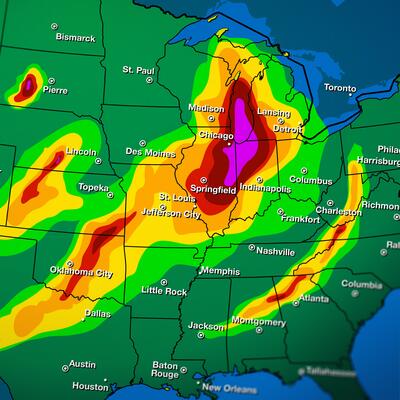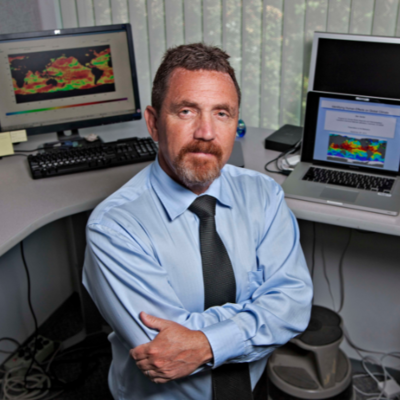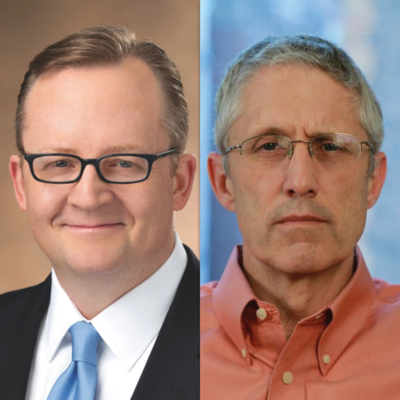
Climate Press Pool: Robert Gibbs and Jeff Nesbit
Guests
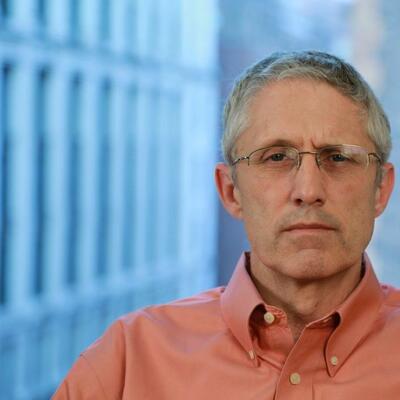
Jeff Nesbit
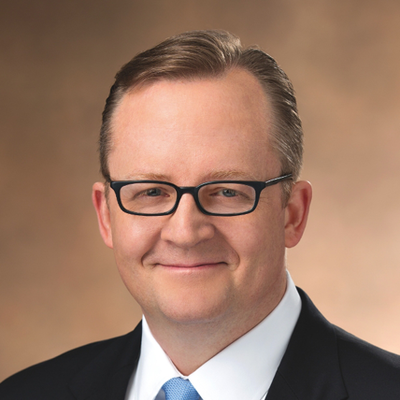
Robert Gibbs
Summary
Climate used to have bipartisan support. Now that the Republican party is skeptical about fighting climate change, companies are moving into a leadership void. On the show today we'll hear from two former White House spokesmen in Republican and Democratic administrations now working on climate from different angles. Robert Gibbs addresses what McDonald's is doing to cut its carbon emissions and environmental impact. Jeff Nesbit heads a communications organization trying to get the climate story covered more prominently in the mainstream news media.
Full Transcript
Announcer: This is Climate One, changing the conversation about energy, economy and the environment.
Climate used to have bipartisan support. But with the Republican party now skeptical about fighting climate disruption, some corporations are filling the leadership void.
Robert Gibbs: Almost 70 million people go through McDonald's every day, so we challenge ourselves as a company to be a better McDonald's every day.
As chief communications officer for McDonald's, former White House press secretary Robert Gibbs addresses what the company is doing to reduce its carbon footprint.
Another former White House spokesman, Jeff Nesbit, who led Vice-President Dan Quayle’s communications team, is also trying to show Republicans a way forward on climate.
Jeff Nesbit: If you’re under the age of 35 and you’re a self-identified Republican on this issue, never mind the Democrats the independence but just take the self-identified Republicans. They look like Democrats on this issue. They want to do something.
Announcer: Jeff Nesbit and Robert Gibbs. Up next on Climate One.
Announcer: I’m Devon Strolovitch. Climate One conversations – with oil companies and environmentalists, Republicans and Democrats – are recorded at the Commonwealth Club of California, and hosted by Greg Dalton.
On today’s show we'll hear from two former White House spokesman – a Democrat and a Republican – now communicating climate solutions.
Robert Gibbs: You look back at Copenhagen as a moment missed, but in reality I think that discussion and those discussions that we had in that room for a few hours while we didn’t walk out and sign any big declaration really did lay the groundwork for those big countries not being able to not be part of this.
Robert Gibbs served as White House press secretary under President Obama from 2009 to 2011. Since 2015 he’s been the chief communications officer for McDonald's Corporation. We’ll hear Greg’s conversation with him later in the show.
First Greg talks to Jeff Nesbit, former communications director for Vice-President Dan Quayle, and currently executive director of Climate Nexus, a communications organization trying to get the climate story covered more prominently in the mainstream news media. His new book is This Is the Way the World Ends: How Droughts and Die-offs, Heat Waves and Hurricanes Are Converging on America
Greg Dalton: Jeff Nesbit, welcome to Climate One.
Jeff Nesbit: Thanks for having me.
Greg Dalton: 30 years ago Jim Hansen testified before Congress climate got on to the front page of the New York Times for the first time. Later that year in the presidential election climate was an issue. I’d like to play a clip from a vice presidential debate in which Dan Quayle and Lloyd Bentsen were asked a question by Jon Margolis of the Chicago Tribune.
[Start Playback]
Female Speaker: Jon Margolis, a question for Senator Bentsen.
Jon Margolis: Senator, we've all just finished -- most America has just finished one of the hottest summers I can remember. And apparently this year will be the fifth that of the last nine that are among the hottest on record. No one knows but most scientists think that there’s something we're doing, human beings are doing, are exacerbating this problem and that this could in a couple of generations threaten our descendants’ comfort and health and perhaps even their existence. As vice president, what would you urge our government to do to deal with this problem and specifically as a Texan, could you support a substantial reduction in the use of fossil fuels which might be necessary down the road?
Lloyd Bentsen: Well, I think what you can do in that one and which would be very helpful is to use a lot more natural gas, which burns a lot cleaner. But the greenhouse effect is one that has to be a threat to all of us and we have to look for alternative sources fuel. And I've supported that very strongly.
Dan Quayle: And the greenhouse effect is an important environmental issue. It’s important for us to get the data in to see what alternatives we might have to the fossil fuels and make sure that we know what we’re doing. And there are some expirations and things that we can consider in this area. The drought highlighted the problem that we have and therefore we need to get on of it and in a George Bush administration you can bet that we will.
[End Playback]
Jeff Nesbit: Quite interesting.
Greg Dalton: 30 years ago you went on to become White House Press Secretary for Vice President Dan Quayle. President Bush did go to the Rio Earth Summit. For 30 years, what’s happened?
Jeff Nesbit: Well can I just comment on that clip first it’s fascinating to watch. I actually was one of the small group of folks who prepared Dan for that vice presidential briefing. And what most people remember from that briefing is the famous Bentsen line, you know, about Jack Kennedy, you know, Jack Kennedy is a friend of mine that’s what most people remember from that debate.
Greg Dalton: They remove the JFK line, not the climate.
Jeff Nesbit: Right. But you look at that answer, Dan's answer in my opinion was better than Lloyd Bentsen's in that clip 30 years ago. So think about that. I mean I would argue that Dan's answer, you know, that it’s real we need to do something we need to look at our alternative fuels. He answered that question very straightforwardly. No Republicans today will actually do that. And that is a significant political problem. We need Republican leaders to first acknowledge the reality of the impacts we’re facing which is why I wrote the book I wrote that's about to be published. And we need more leaders who are willing to stand up and say let's look for some solutions. The Republican Party has lost that ability in today's environment.
Greg Dalton: And the recent article in the New York Times Magazine said there was a bipartisan consensus at the end of the 70s and the 80s involving Bill Riley who was the EPA administrator under Bush-Quayle. So what happened?
Jeff Nesbit: So what happened actually and I know this will sound strange. But in my previous book I actually talk a lot about what happened. My last book called Poison Tea --
Greg Dalton: Yeah, I was gonna ask you about that.
Jeff Nesbit: So Poison Tea in the entire first chapter talked about what happened with the BTU tax in 1993. And what happened in --
Greg Dalton: First effort to put a national price on carbon.
Jeff Nesbit: Yes it was the beginning of that process. They proposed essentially a carbon tax in the Clinton budget it wouldn't have gone into effect the ship but as a principal and President Clinton’s first budget they proposed, you know, a BTU tax or a tax on energy on carbon. And the Koch donor network which at the time and what my book Poison Tea, you know, sort of unmasked was that the relationship between the emerging Koch donor network and Koch political network in the tobacco industry. And they were fighting both of them linked arms to fight cigarette excise taxes and a BTU tax and they knocked the BTU tax out of the first Clinton budget and then they’ve used it as a bludgeon inside the Republican Party ever since. So that if anybody stands up and says, you know, anything about, you know, potentially a solution to the climate issue there is always the looming threat that they’d be primaried. And starting from the early, you know, to mid-1990s until today it’s really difficult for an elected Republican leader at the federal level to talk about that issue because if they do, there's this threat of to be primaried. I actually happen to think we’re seeing a new tectonic split in Republican Party I think we’re gonna see it really emerge in the next two years. I just talked to a sitting Republican member of Congress who wants to start to address this issue publicly and talk about it, at least half the party wants to deal with this issue on the Republican side of the equation. If you start to see that happen, and it matches with the 75% of the American public who want real solutions to this issue I think by the next presidential election and beyond we’re gonna see a consensus emerge and we’re gonna see a climate policy law at the national level.
Greg Dalton: There is the climate caucus in Congress they call the Noah's Ark Caucus.
Jeff Nesbit: The Noah’s Ark, yeah, one by one, yes.
Greg Dalton: One Democrat, one Republican, chaired by Carlos Curbelo represents the southern tip of doomed Florida that sinking Florida. He proposed a carbon tax to replace the gasoline tax. Any traction on that?
Jeff Nesbit: So I'd love to talk about that because our organization helps the Climate Leadership Council as well as others who are advocating for carbon tax. So the Climate Leadership Council is another effort that’s called the Baker-Shultz plan, Jim Baker, former Treasury Secretary under Presidents Bush and others, George Shultz and --
Greg Dalton: Trent Lott, Bill Frist.
Jeff Nesbit: Trent Lott now lobbying on it, yes.
Greg Dalton: Lots of the, I would call old guard --
Jeff Nesbit: Sort of the old guard. Correct.
Greg Dalton: --of Republican elders, yeah.
Jeff Nesbit: Yes, the Republican elders have said, so we’re actually getting quite a bit of traction around the Baker-Shultz plan. We’re not at the point yet where elected Republican members of Congress will introduce it but I think you’re gonna see that sooner rather than later. So whether it's the Curbelo bill, which in my opinion starts too low and actually uses the money for other things. I think the better approach is a significant price on carbon that rises with an environmental integrity mechanism which means that it continues to go up until we get the job done combined with, you know, transparency about where the money goes. I believe it should all go back to the American people because once you got a dividend that everyone is receiving it’s a lot like Social Security, Medicare, that everybody sees the benefit and doesn't focus on the cost which might be a slight increase in energy. So I think whether it’s Curbelo, there's another bill that’s about to be dropped that also talks about a carbon tax at the federal level by some Republicans. It hasn’t happened yet but will shortly the Baker-Shultz plan and others. We’re seeing an emerging consensus around whether it’s price on carbon or, you know, conference of set of solutions even half of the Republican party is starting to see we’ve got to do something like that.
Greg Dalton: Introducing a bill is easy it gives you something to talk about back home when you go visit your district for Easter. They know the story of Bob Inglis who was tea partied out of Congress, he was a climate denier, vilified Al Gore, his teenage daughter came to him and said, hey dad, look at the science. He did, he switched. He said I believe in climate change -- not I believe, it’s not a belief.
Jeff Nesbit: It’s not a belief, yes exactly. Yeah.
Greg Dalton: Accept climate change.
Jeff Nesbit: Correct.
Greg Dalton: He faced the tea party primary and those legislators know that if they stand up against that there will be Koch money against them. The Shultz-Baker plan may be logical, but there's no money behind it to go up against the --
Jeff Nesbit: But there will be that's actually starting to emerge. So you're exactly right. Traditionally in the past, two things have -- but two things have changed recently that are gonna change that equation in my opinion. The first is that we actually have our own polling the shows and so do others. If you’re under the age of 35 and you’re a self-identified Republican on this issue, never mind the Democrats the independence but just take the self-identified Republicans. They look like Democrats on this issue. They want to do something. They’re the future of the Republican Party and if they lose them on that issue and may be immigration and racist tinged things that the Republican Party is dabbling in, they’re gonna lose an entire generation of voters. They may lose their capacity to be a national party in the United States on this issue and others. And Republican leaders know that.
Greg Dalton: But the people don't -- environment doesn’t rank in top voting issue.
Jeff Nesbit: Can I push back on that actually and show you how it does actually. It doesn't currently, unless you do something like this. We just ran a national poll in Florida where we tested this issue. And yes, when you start at the baseline, concern about environment it ranks downward always it’s 9th or 10th in the list of voters. When we started to ask the entire range of voters in Florida about impacts, local impacts, impacts to their economy, sea level rises, you know, starting to put saltwater into their marshes and their lakes even their communities. The impacts of hurricanes when it hits and then we combine that with aspirational messages like would you like to see a solar revolution in Florida for Florida to lead the way. So you combine impacts locally, impacts to the economy things that they can see out their window with changes in their economy that are related to clean energy. When we did that, climate moved jumped 19 points to right below healthcare as the second issue that would send them in the polls. So I think we’ve been missing those connections. We need to make those connections between impacts that are occurring now not 50 years off in the future combined with the aspiration that everybody wants, everybody wants a clean energy revolution. When you combine those two then it becomes a powerful voting issue and we haven't really done that yet and I think when we do that we'll see those numbers move.
Greg Dalton: Something I just learned about the environmental voting project is looking at 10 to 15 million so-called super environment, who rate environment very highly 10 to 15 million of them did not vote.
Jeff Nesbit: That’s crazy. Yeah, they need to go out and vote.
Greg Dalton: And their solution for getting them to go out and vote on climate is to not talk about climate to get them to vote. As a pledge, I pledge to vote or you vote because your neighbors are doing it, not to talk about the issues but to basically reframe it.
Jeff Nesbit: Right. You’re exactly right and then the other big change that you’re gonna see shortly, is that lots of big companies that do provide money into the system that do lobbying they're all coming into this issue right now. Even Exxon Mobil and BP and Shell, Shell has been up on the hill quietly lobbying for carbon tax in the last year. They're all starting to come into this picture every, I could cite chapter and verse. Climate Nexus, you know, helped start the We Are Still In coalition there’s lots of corporate members. There are other efforts that are and what you're seeing is everybody other than the extractive industry players are all gaining on this issue and want to see solutions. They’re gonna bring money to that game so that will start to help the system where, you know, that up ‘till now if you wanted to talk about this and you’re a Republican you would get primaried, I think that balance will start to shift.
Greg Dalton: Because for years, oil companies have put on their websites we supported carbon tax --
Jeff Nesbit: But then didn’t do anything.
Greg Dalton: Didn’t do a thing about it.
Jeff Nesbit: And didn’t lobby, didn’t put up their money I think that’s change. I know for a fact that’s changing and I think it’s gonna change quickly.
Announcer: You’re listening to a Climate One conversation with Jeff Nesbit, former communications director for Vice-President Dan Quayle, now executive director of Climate Nexus. Coming up, Greg Dalton asks about the connections between climate, national security, and mass migration.
Jeff Nesbit: It’s unconscionable that the United Nations has not changed their definition of a refugee. They have to do that. I don't care what they need to do. They don’t qualify. That’s insane.
Announcer: That’s up next, when Climate One continues.
Announcer: We continue now with Climate One. Greg Dalton is talking to Jeff Nesbit, former communications director for Vice-President Dan Quayle, and author of This Is the Way the World Ends: How Droughts and Die-offs, Heat Waves and Hurricanes Are Converging on America. Here’s Greg.
Greg Dalton: I’ve interviewed a lot of people over the years with audience questions. I vividly remember one moment about five years ago when someone stood up, a reporter stood up and said, you all suffer from the information deficit delusion. You think that one more podcast, one more radio show, one more book is gonna change people's minds and get them to act. People are not acting for a lack of information. They’re acting for other reasons that we can get into. So as a communicator why do you think one more book with a doom and gloom title is gonna make a difference?
Jeff Nesbit: Because it's not just one more book with a doom and gloom title. Let me back up a little bit. I've had hundreds of arguments just like you have with the information deficit crowd. And they're generally right the social -- I used to work at the National Science Foundation I know how this works really well. But here's the difference. What has been missing, here’s why I wrote this book. What has been missing it’s not that it’s a doom and gloom book, it’s that people, the American public has come to believe that this is an issue that’s way off in the future. Because all of the scientific models, the scientists are quite comfortable talking about things that occur well off in the future. They get profoundly uncomfortable talking about what's happening now because it's much harder. So I decided we need to change this narrative this media narrative and just lay it out for people. There are things happening all around the world right now that are causing immense harm and suffering and pain and damages. They may not have started to occur in the United States yet but it’s only a matter of time before they do. So that's what this book does. It’s not just another doom and gloom book about the future, it lays out in very clear start terms what is happening right now with water scarcity, food insecurity, climate migration and several other factors. People need to recognize these things are happening right now not 50 years in the future. We don't have the time to wait because we’re seeing significant impacts now that will grow worse and worse and worse starting right now.
Greg Dalton: And you don't think people got that from Katrina and Harvey.
Jeff Nesbit: No. I don't think they do.
Greg Dalton: And Irma and Florence.
Jeff Nesbit: In the moment they do so all the polling shows in the moment they do, but then it goes away. In the moment they do with the hurricane then it goes away. The cattle farmers in Texas who had to move all of their cattle out of Texas, North in the drought. Yeah, there’s something going on and then it goes away and the rains come back and then they say, oh okay, well maybe.
Greg Dalton: Guess it’s solved.
Jeff Nesbit: Guess it’s solved. So these things are, you know, anyway, so the point of the book it’s not really a doom and gloom book it’s basically so that people need to understand it is here right now. The wolf was at the door right now not 50 years from now.
Greg Dalton: One reason that I think a lot of intellectual an issue on your books, don't get through as they speak to our heads and our hearts. So there's a moment early in your book where you talk about Terry Root then a professor at Stanford. And she breaks down with you interviewing her. Tell us that story.
Jeff Nesbit: So yes and Terry I mean she is one of the pioneer scientist in the world. She taught us about biodiversity before anybody even knew what biodiversity was. And for those who don't know and Terry was married to Stephen Schneider, one of the grandfathers of the climate movement. Terry was the very first scientist to ask the big question. Are birds migrating and are they being affected by climate change are they changing their patterns? And she proved conclusively that they are. All birds are migrating differently because of climate change. And so that was the first big pivotal study and from there, you know, lots of other experts she was the co-author of the first biodiversity report for the United Nations report. She knew the story backwards and forwards and she kept doing study after study after study that really made the case that, you know, leading to now when we know that half of all species are experiencing local extinctions because of climate change. So that's all within her framework. In an interview, I was just asking her some simple questions about her field and she kept breaking down in her answers. And I finally said, you know, why are you so concerned and she basically said, I feel like I failed to convince the public about what's happening. Which is really, you know, tragic because the scientists know they know what's happening they can see it all across the board. And so I think she was just expressing what others do, you know, in a very profound and sad way which is I just wish the public knew what we know.
Greg Dalton: You mentioned you work at the National Science Foundation, the climate conversation started kind of in outer space with chemistry and physics. In my own journey in 10 years, my own journey when 10 years of interviews at Climate One has gone from chemistry and physics to psychology and sociology and how our human brains are not well suited or wired to perceive slow-moving distant threats. And that's informed a lot of communications how to talk to people not leave with doom and gloom. I’m interested in your insights on the social sciences and the human cognitive part of the climate. Because I think so much is focused on smokestacks and tailpipes and what’s between our ears.
Jeff Nesbit: Yeah. So I wanna back up just a little bit. So whenever you talk to somebody about a potential problem, you have to give the problem the solution at the same time. And she would hate me for doing this but I’m gonna use my daughter’s example. She's currently the chief resident in pediatrics at UCSF Children's here in San Francisco. And she would be the first to tell you if you're a doctor and you go to the bedside, you have to deliver the problem that they're facing and then the treatment plan, you do it both at the same time. And my argument and the reason why I wrote this book is that people need to understand the problem is here right now and it's demonstrable it’s across the board it's having impacts that affect everything from national security to food and security to water scarcity to you name it, it’s all occurring right now.
Greg Dalton: And that’s a very new thing. We heard Quayle and Bentsen talking about descendants and future generations.
Jeff Nesbit: Correct. And now we’re the future generation. I mean Nestlé did a survey of water scarcity and predicted that water scarcity would be the gravest threat facing our planet by 2025 and this was 10 years ago when they made that that prediction. But to come back so it's not that you present doom and gloom people need to understand the threat right now and then pair that with the solutions. And you have to do them both at the same time and in a way that is credible on both sides of the equation.
Greg Dalton: The attack on science is something that's got a lot of attention lately, you worked at the National Science Foundation we heard, you know, Lloyd Bentsen and Dan Quayle kind of defending the science. What's the antidote to that you fight facts with facts again the cognition, facts are confusing there’s always a counter fact.
Jeff Nesbit: Yes they are but the antidote so, you know, I once wrote a column for Time Magazine about this that the only antidote to fake news is real news. So and science evidence and facts have to be the basis. When science evidence and facts are the basis of policy and political decisions you're always gonna be on safe ground. When you waver from that when you veer off into gut feel and instinct and you move away from science evidence and facts you’re gonna be in trouble because you're on uncertain ground. So that's why it's not that you want to constantly bombard people with information but anything that you work on from a big policy standpoint has to be based on science evidence and facts otherwise, you have nothing to base your policy on. So I think we’re almost there honestly, with climate science we’re back to a point where 75% to 80% of the American public generally recognizes that climate change is real and it’s a problem. It’s only 25% of the American public that, you know, thinks it's a hoax or dismisses or whatever and that happens to be the same core of President Trump’s base. But most of the public and if you look at any major public policy role it's, I call it the 75/25 rule when you get to 75% who generally want to see something done or will allow it you’re almost there then you have to get past the political hurdles. We’re there with climate change, and we’re back to the media gets it the, you know, most of the public gets it. The remaining hurdle is, you know, how do you get past the political hurdle and that's a different question.
Greg Dalton: If you're just joining us, we're talking to Jeff Nesbit, former communications director for Vice-President Dan Quayle. He’s now executive director of Climate Nexus. This is Climate One, I'm Greg Dalton. Used to be that a big serious -- Katrina would happen and months later scientist would say maybe this was connected to climate and then that gap started to narrow --
Jeff Nesbit: And we can do it in a real-time right now.
Greg Dalton: And for the first time with Florence I saw news accounts saying --
Jeff Nesbit: From Stony Brook, yes.
Greg Dalton: From climate impact, climate made Florence stronger, more probable, etc. in as it’s happening.
Jeff Nesbit: In real-time. That was from Stony, we actually helped we work with them. They took a standard climate model, ran it on the supercomputer and were able to show it was Florence was more intense, more rainfall, more precipitation, wider in terms of actual area. So that they are able to show in real time the climate links to this hurricane.
Greg Dalton: The other thing I see from Climate Nexus called Climate Signals which is, you know, there’s so much information people are overwhelmed in kind of putting a little climate thumbprint on regular news to say, hey, here's climate because I see everything through climate lands, most people don’t.
Jeff Nesbit: Oh I do.
Greg Dalton: Most people don’t and they’re like hey, this mosquito thing is climate, hey, this fire has a climate element to it. Hey, you know, this road eroding has a climate element to it, so Climate Signals.
Jeff Nesbit: Yeah. Well thank you. And the reason why we started the Climate Signals project was for that exact reason. So at any given time there are dozens of events that are going on that make news locally, all across the United States that mostly is our focus. We have some global events but most in the United States. And so what Climate Signals does is it uses all of the peer-reviewed scientific literature and makes those connections for reporters and people. If you want to know what are the Climate Signals running in the background connected to this event, you can go and find it. So it becomes the basis of the background material that goes and informs either the media coverage or the understanding of that event that’s going on. Because we think that that's important, people need to understand, you know, it's a very complicated subject. So we try to make it as, you know, we try to make those connections for everybody so that they can understand if they really want to go deeply they can read the Nature article or the Scientific American article or the peer-reviewed, you know, science study or whatever they need, you know, to really go deeply into it or they can just read through then make the connections themselves.
Greg Dalton: People often look at climate and think about okay say, you talk about sea level rise. Well, I live on a hill I’ll be okay. And then you explain to them well, actually, when you flush your toilet it goes to a treatment plant that might be flooded. Similarly with temperature northern latitudes, one thing I learned from your book that I didn't know, is that more warming will occur in higher elevations. I’ve had fantasies of well I’ll move to the hills and it will be cooler, not so.
Jeff Nesbit: It’s not so. And all I have to do is look at what happens to ice and the glaciers. I mean we’re just now starting to see the Chinese researchers who have been studying the third pole the Himalayan glaciers in just one regional alone, and it's only just now emerging because they hadn’t talked to anybody about it until now is that in just one small area, 500 small glaciers have completely disappeared because it was hotter up higher. And so if that’s the case, that’s really dangerous for the glaciers that are at these higher elevations. That means they’re probably melting faster than we thought but we need to find out. So that’s also gonna have an impact on say the mountain gorillas who have to go to higher elevations. They might not be as safe as we thought, or for the America -- or anything that is going up to higher elevations.
Greg Dalton: Well you mentioned the Himalayas the water towers of Asia that feed five major rivers billions of people. You write about international stability and the National Intelligence Council, under President Obama building on work under President Bush that look at India, China, Russia, North Africa elsewhere. So tell us about the part of national security and potential massive migration for which no country is prepared.
Jeff Nesbit: So I’m gonna use a couple of it there are two chapters, one on Yemen and one on Somalia as examples. People don’t realize Yemen has essentially run out of water. 14 of their 16 aquifers are bone dry now at this point. People have been, you know, predicting that would happen it’s actually happened. And it began to happen years before the Civil Wars erupted and chaos erupted. And the water minister and officials who were tracking this said, there's a water war coming it's going to happen and it will then lead to all these other problems and that's exactly what happened. They ran out of water then the water they had left they use to continue to grow khat which is a narcotic that people use. They ran out of water that led to civil unrest and the government collapsed. Then you look at Somalia extended droughts and also water scarcity. Somalia may be unlivable now at this point. So both of those present massive national security problems. It increases the rise of terrorism, you look in these places where there's no hope, terrorism movements begin and then migration begins. We’re seeing this now basically you look at the Sahel region across northern Africa all of those, you know, those countries across the Sahel the farms they don't know what to do so they’re just migrating and that’s the heart of why you see so many people trying to get to Europe and causing that trouble. We're seeing climate migration right now. And one of the things I talk about in this book it’s unconscionable that the United Nations has not changed their definition of a refugee. They have to do that. I don't care what they need to do.
Greg Dalton: Climate refugees don't qualify.
Jeff Nesbit: They don't qualify that’s insane. I mean and sadly because there is no standard definition and the United Nations hasn’t recognize it. When somebody from the Maldives tried to resettle into New Zealand, the High Court of New Zealand ruled well, there's no definition the United Nations doesn't recognize you so therefore, you got to go back home where there's no hope in the Maldives, because the ocean is taking over the country.
Greg Dalton: We had here in this room the head of the International Rescue Committee saying that he didn't think climate migration was much of an issue.
Jeff Nesbit: Oh my rgoodness. I mean that the book kind of does it goes around and talks about the water problems in Jordan that, you know, you’re seeing saying migration everywhere. When people, when the natural resources on the land don't support you any longer, you leave. And now maybe in country but you leave, you leave where you are. The problems in Syria happen when, you know, the farms were no longer sustainable they moved to the major urban cities in Syria there were no jobs and it led to cast in Syria. But you see that every, I mean we could go all over the world and you see that problem.
Greg Dalton: Yeah and that’s for people who have climate glasses and seen the climate and a lot of people don't see climate where you and I do. I wanna end, we started with you as a communicator working in the White House, you’re a journalist communicator, climate is thought to be the anti-story by some journalists. Chris Hayes at MSNBC tweeted recently that climate is a ratings killer. We've had Greg Gutfeld, Fox News, he also said climate is a ratings killer. It’s one thing that MSNBC and Fox News agree on. Ira Glass has lamented that it's difficult to tell all compelling climate stories because we know how they end that there's not emotional surprise or tension, back to doom and gloom. So your thoughts on climate as a narrative and its limitations because we know humans evolve telling stories, stories are what we connect to and the climate story isn't getting through.
Jeff Nesbit: I’m gonna be rude here. Chris Hayes is dead wrong. Ira Glass is dead wrong. They're all dead wrong. They just don't know how to tell a story properly. Climate change is a human impact story. It's a species impact story. It's a community impact story. It's an economic impact story, but at its base is a human impact story. So it's not environmental story, it’s a human impact story. And second, we need, those of us who are communicators, we need to do a better job of giving anybody who comes into the story what can they do about it. We have actually failed in that in my opinion. It’s one of our big failures in this movement to give them what can we do about this. I was involved in the tobacco wars way back when and we eventually gave people, you know, avoid secondhand smoke and if you can, stop smoking. We gave them the tools for getting away from that we've not done that with climate and maybe, you know, one of the things there are natural solutions for instance, there’s science showing that if you build trees and create local backyard gardens for instance, you’re gonna help that adds up into a carbon sink. There are things that people can do, we need to give them that information.
Greg Dalton: Jeff Nesbit, thank you for coming to Climate One.
Jeff Nesbit: Thank you for having me.
Announcer: Greg Dalton has been talking to Jeff Nesbit, executive director of Climate Nexus, and author of This Is the Way the World Ends. Coming up, Greg asks former White House press secretary Robert Gibbs about reducing the environmental impact of the world’s largest restaurant chain.
Robert Gibbs: Almost 70 million people go through McDonald's every day, so we challenge ourselves as a company to be a better McDonald's every day.
Announcer: That’s up next, when Climate One continues.
Announcer: You’re listening to Climate One. Robert Gibbs was White House press secretary for the first two years of the Obama administration. He’s currently executive vice president and global chief communications officer of McDonald's, the world’s largest restaurant chain. Greg Dalton spoke to Gibbs about what McDonald's is doing to cut its carbon emissions and reduce its environmental impact.
Greg Dalton: Well Robert Gibbs welcome to Climate One.
Robert Gibbs: Thank you for having me.
Greg Dalton: I wanna begin with a lead from a recent Forbes article that said millennials don't go to Applebee's they don't have kids and they don't buy homes. They do spend astronomical amounts of money on dogs and avocado toast and they’re driving force behind a global shift away from meat. So as America's iconic burger company, what are you doing in a world that’s moving away from meat?
Robert Gibbs: Right. Well, I think any brand and particularly a food brand has to live where its customers live and to progress where its customers progress. So that could be a whole range of options. I would say, I don't know the exact figures, but my hunch is that we sell just about as much chicken now as we do meat. And maybe those examples would consider that all to be sort of part and parcel of the same. But again, I think the way you have to look at the world is you're either gonna disrupt what you're doing to meet what the mindset of customers is or somebody is gonna disrupt it for you and it’s best for you to be in charge of your own disruption.
Greg Dalton: So thinking about sustainability yesterday White Castle added vegan slider to their menu nationally. They’ve already selling Impossible Burger, plant-based burger, Burger King has veggie burgers. When you think about sustainability, is the menu on the table at McDonald's?
Robert Gibbs: Yeah, absolutely. And if you think, we sell throughout the world first for people to understand we have 37,000 restaurants in 120 different markets. And so menu innovation is something that happens literally all over the world. And we certainly have in Sweden or in Germany we will have different types of offerings. Some of them are veggie burgers, different types of things that appeal to different customers. And so I think we’re always thinking through and trying to innovate on what will drive customers. I think one of the challenges we probably candidly had in the U.S. is there isn’t a huge demand for it and if we put stuff like that on the menu here and not found a huge demand for it, maybe that changes again, as you mentioned with where --
Greg Dalton: Maybe they weren't very good. A lot of veggie burgers aren’t very good.
Robert Gibbs: Well right it’s a different cooking technique, right. I think as we go along and as people expand as their tastes expand as the demand changes you'll see companies like ours meet that demand when it's there.
Greg Dalton: I talked with a sustainability person at Harley-Davidson at one point. And he said, we can make electric motorcycles, but our brand is so much defined by the roar of that Harley engine.
Robert Gibbs: Right.
Greg Dalton: So a quiet Harley just doesn't feel or sound like a Harley. So is there a brand challenge as a burger company to serving things that are not burgers?
Robert Gibbs: You know, probably for all brands there is that challenge. I would say that that person at Harley as a proud electric car owner, when you step on the power pedal if you will, I guess it’s technically not a gas pedal in those cars.
Greg Dalton: Accelerator, yeah it’s thrill.
Robert Gibbs: I don't hear the roar of my car but I certainly feel it and it can be a lot of fun. I think successful businesses we’ve been around for more than 60 years. If you’re standing still and doing the same thing you're doing 60 years ago, you know, chances are your business isn't the same or you occupy just a very different space. And so I think that people are going to eat beef I think more people are going to likely eat beef. And the question and challenge for us as we have goals to decrease our carbon footprint is how do we do that in a better way how we do that in a more efficient way. But I think again it's hard to picture what five years or 10 years looks like but I don't think anybody can stand still.
Greg Dalton: One thing that’s coming up is lab meat clean meat. There's different names for basically, you know, a steak or a burger that doesn't come from a cow, it’s cells grown in a laboratory. Tyson has invested money in beyond meat. Cargill has invested in Memphis Meats, these are both lab meat companies. Is that on your radar at all?
Robert Gibbs: Well both those are suppliers of ours. And again I think with customer mindset changing you're always looking out for where the markets gonna go. Again I think part of it really depends on how big I should say is the demand for that. And I think many of those as you mentioned are bit more in their infancy and certainly they will likely grow in popularity and find that customer set and as that happens, you'll have more and more people likely come online. But again menu innovation where people what people want and where they're going to get it is if it wasn't on our mind we wouldn't be here for 60 years.
Greg Dalton: What are the real drivers for sustainability? Is it shareholders, customers brand, what's really driving sustainability at McDonald's?
Robert Gibbs: To me I think it's probably all of those things. I think customers are demanding more responsibility from the companies that they themselves want to be associated or do business with. I think boards of directors and management of companies have seen and listened to investors and shareholders as you said have a greater interest in the responsibility that a corporation has. And I think we also believe because of our size and our scale that we have both the ability and that responsibility to use it for good. And so I think there is right now a bit of a synergy with all of that. And I would say too, you know, we are because we're a food company where our food is grown how it's grown whether it can be grown is central to our business. So we were just at an event and talking about coffee farming and you can't just do that anywhere you have to do that in very specific places at very specific altitudes.
Greg Dalton: That’s changing.
Robert Gibbs: Right. And as the climate changes as the biosphere changes it’s gonna put real pressure on a group of people that are growing coffee for a living. A group of people that are buying coffee and for coffee drinkers. And so in some ways you think to yourself, oh this is nice and it feels good and it sounds good but there's also part of it that if you don't get this right, it can really impact your business. We can't sell a fish sandwich in 37,000 restaurants without guaranteeing a supply chain that’s sustainable, if you can't, you won't do that long. And the same is true for coffee, which is why our goal is to serve hundred percent sustainable coffee in our restaurants by 2020. If we can't do that, then we won't sell coffee for long and that will be a big, big impact to our business and to the communities where that's a big part of the local economy.
Greg Dalton: If you're just joining us, we're talking to Robert Gibbs, former White House press secretary under President Obama. He’s now global chief communications officer of McDonald's. This is Climate One, I'm Greg Dalton. The Carbon Disclosure Project ranks and grades companies on various parts of their commitments. In 2017 they gave McDonald's a C on climate a B- on water and a B on forest. Your thoughts on that I know you’re not deeply involved in the carbon accounting, but -- says you’re doing pretty well on forest, climate, average.
Robert Gibbs: And so the year that was 2017.
Greg Dalton: Right.
Robert Gibbs: So it probably doesn't again take into account the big step that we did this year in March in announcing the verified science-based target around climate.
Greg Dalton: One of the first food companies to do that.
Robert Gibbs: Yeah, and the only restaurant company. So, you know, I think that's a big step change for us forests are hugely important our packaging and recycling our goals around making sure that we’re using certified only using certified products that we’re making sure that they are recyclable compostable all of those things go into these broader commitments that we have to make. And so I think we challenge ourselves as a company to be a better McDonald's every day to figure out how because we’re in so many communities and we serve, you know, almost 70 million people go through McDonald's every day. So we've got that responsibility every day to think about how we're better at being McDonald's.
Greg Dalton: Lot of environmentalists look at cows and beef it's a big part of any individual’s personal carbon footprint. Some people say that cows are part of the solution they’re not the enemy that cows can be when managed properly and not in a big factory farm but spread out over lands can help sequester water and carbon in the ground. Don't kill all the cows they can be part of a balanced ecosystem. And if McDonald's got into something like that that could be huge but is it legitimate?
Robert Gibbs: I think it is legitimate. I think the biggest challenge we have, and when I say we I mean the world, is how do you figure out the best way to do some of these things and then how do you partners that can scale it. And I think that's part of where we come in we're investing in and working on research with lots of different partners to find out what those answers are but then again because we do business with so many people and because we have a supply chain that's so broad if we can find some of these answers we have the ability to scale that across the value chain pretty quickly. A good example in 2015 we made a commitment in the U.S. to go to cage free eggs. We used 2 billion eggs in McDonald's in the U.S. system. There weren’t 2 billion cage free eggs that existed when we made that commitment, but that commitment begins through egg producers to create a marketplace that one that we can meet that commitment. But as more and more egg producers now go because they want to do business with us, I forget the exact number but on the order of 140 or 150 food restaurant companies made cage free egg commitments after we had made ours because that set a market that created a marketplace and the gives you that sense of power in scaling. And so I think that for us is figuring out how we can -- figuring out what's the best thing to do and then using that size and scale to bring it to a lot of different people.
Greg Dalton: We’re in an era of deregulation the auto companies and others are looking to rollback. Was ever there any thought that this will blow over they take advantage of this moment of deregulation to ease back from sustainability commitments?
Robert Gibbs: No, I mean I think look, I would say one thing too as a business is you have to understand that you’re -- I'm straddled, I’ll do this from both the political and the business side. We may change our governor we may change our mayor we may change our president every 4 or 8 years, but I think what one what society expects doesn't flip every 4 or 8 years. What we have to do, particularly on the issue of climate isn't gonna flip every 4 or 8 years. And quite frankly, I think smart businesses understand that going backwards doesn't make a ton of sense, because chances are that pendulum’s gonna swing and you’re gonna be expected to have continued making progress. And so you’re gonna end up as a business lurching back and forth it’s much, much better to pick up, no pun intended, a sustainable path and follow that. It makes sense for your business it makes sense for your customers it make sense for your brand.
Greg Dalton: You were in Copenhagen at the failed climate summit in fact I think you are part of that famous scene where President Obama barged in on a group of countries that were negotiating behind our back, his back.
Robert Gibbs: It was a fascinating day, you know, we landed and all of a sudden, you know, we’re there, you want to start, you want to get into these meetings and he was anxious to get into these meetings and, you know, certainly you’re meeting with our European partners and then almost one by one these meetings start getting canceled. You can't find the Chinese delegation you can't find the Brazilian delegation you can't find the South African delegation you can't find the Indian delegation. All these are oh, you know, Zoom is on the way to the airport, Lula is not coming back -- all these sort of things and I remember juggling phone calls and handing the phone to the President, he's trying to find people. And then I forget who it was, somebody comes and says, I found them, they’re in this room off in the corner and, you know, first of all we had to get into the room and that was no small feat because there were a decent number of Chinese security that I mean, I literally had to push, literally push through, one, to get the President and to get Secretary of State Clinton in. I also wanted to make sure that if we were bringing the President into this meeting that I had a duty as the White House press secretary to make sure that our press corps could -- they can't stay in the whole meeting but they need to get a picture of what the president is doing. We felt that was hugely important. Certain state security didn't think that was as important as we did. But when we got in the room I mean you never forget the look on their faces. I forget the exact quote but he walked in and he said, “This is great I found you. Now we can have a good conversation.” And it was pretty fascinating to watch, I mean, you look back and, you know, I wish we have done more to be able to broadcast that because, you know, you look back at Copenhagen as a moment missed, but in reality I think that discussion and those discussions that we had in that room for a few hours while we didn’t walk out and sign any big declaration really did lay the groundwork for those big countries not being able to not be part of this. And I think that was the big thing was okay we may not have like I said signed anything out of that but everybody was sitting at a table again. And we weren't having this argument about well this amount of countries have to be in, we have to exempt this -- everyone was sitting there. And so, you know, it provided the basis for what would eventually happen in Paris.
Greg Dalton: A lot of people look back at that window of 2009 Waxman-Markey passed the house, Copenhagen failed and think if President Obama had tried harder he could have got a deal on climate, could have got something through the house. We got it through the house, Nancy Pelosi got it through the house that that was a real missed moment 10 years on, you know, a lot of damage has been done fires, floods. Do you think that that was a real -- if he tried harder could he have got it done?
Robert Gibbs: You know I don’t think we could have gotten it done. One, we had a lot of stuff we were trying to get over --
Greg Dalton: Healthcare first, healthcare first.
Robert Gibbs: Healthcare, the economy. I mean look, I remember sitting in my office the day the House voted and even though we had 240 some members the vote was agonizingly close. And it gave you a sense that this was not gonna be easy. I will say I think if you look back on whether it's clean power, whether it's fuel efficiency standards a whole lot of things that the administration did that kept us on a pathway to making progress. And I think, President Obama used to say, you know, progress doesn’t move in this easy straight line it zigs and it zags, it’s up and it’s down. The important thing is to continue making that progress and understanding that we have a limited amount of time to do some important behavior changing things if we're going to truly save the planet. And that requires us all to do what we can do when we can do it and I think that's what's inspiring about having cities and states and countries and NGOs and companies all put that on the line and outline what they're going to do to make all of that possible.
Announcer: Greg Dalton has been talking to Robert Gibbs, former White House press secretary under President Obama, and currently chief communications officer for McDonald's Corporation.
To hear all our Climate One conversations, subscribe to our podcast at our website: climateone.org, where you’ll also find photos, video clips and more.
Greg Dalton: Climate One is a special project of The Commonwealth Club of California. Kelli Pennington directs our audience engagement. Tyler Reed is our producer. The audio engineers are Mark Kirschner and Justin Norton. Anny Celsi and Devon Strolovitch edit the show. The Commonwealth Club CEO is Dr. Gloria Duffy.
Climate One is presented in association with KQED Public Radio.


